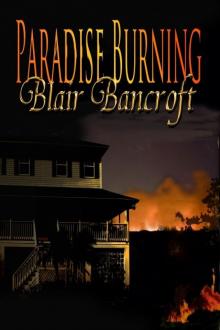- Home
- Blair Bancroft
Shadowed Paradise Page 2
Shadowed Paradise Read online
Page 2
“He’s here,” Brad called over his shoulder, ignoring the woman’s frantic efforts to get past him. Odd. It had been thirty years since he was this kid’s age, but to the best of his recollection, most boys would be having the time of their lives, noses pressed to the glass, awed or smugly satisfied at their own part in an adventure that had turned out three patrol cars, two ambulances and a fire engine.
And yet, the boy had been rock steady when abandoning a car precariously balanced over a flooding river.
Brad instinctively reached out to give comfort, but paused a scant inch from the glistening thatch of hair. Slowly, he pulled back, his fingers moving instead toward the floodlight switch, snapping it off. He backed out of the pickup, gave the woman a boost up, then shut mother and son inside the privacy of the cab. With a shout he headed off the rescue workers who were inching their way toward the Toyota. No need to have to rescue the rescuers.
Funny about the kid, though.
Brad fielded a barrage of questions, tossed back a few terse replies. One of the deputies played his flashlight over the crazily canted car, where water surged up and around front wheels still wedged into the ominous black crack that split the bridge in two. “Hey, Brad,” he called, ambling toward the pickup, “what happened just now? That was one hell of a scream.” Twenty years earlier Deputy Pat Farrell had caught passes from Brad Blue during their years at Golden Beach High.
“Woman thought her kid was missing. Tow truck on the way?”
“Lucky that’s all we need. Damnedst thing I ever saw. Don’t think there’s been trouble with this bridge since it was built.”
“Never had this much rain before.”
“Sure didn’t.” Deputy Farrell glanced at the pickup, then eyed the phalanx of emergency vehicles. “Think we’re gonna need the medics?”
Brad cracked open the cab door. “Everything okay in there? Need a medic?” The woman’s pale face appeared in the opening between the front bucket seats. Somehow she had gotten into the small space where the boy was crouched.
“No. Send them home.” Claire bit her tongue. What a stupid, ungracious remark. “I’m sorry,” she gasped. “Please tell everyone thank you. But lights, sirens, people asking questions would only make things worse. We just need to go home.”
Her rescuer didn’t question her judgment. He simply fished a notebook out of the glove compartment and a pen, dripping wet, from his shirt pocket. “Name, address, phone. Twice. I’ll have Pat—the deputy—give one to the tow truck driver. Then we can go. Pat can wind up his report tomorrow.”
To the hypnotic accompaniment of flashes of red, white and blue, the glow of gold from the fire engine, Claire printed out the requested information, scrawled her signature across the EMS release form; then, sick at heart, she turned back to her son’s bent head. Jamie’s chin was sunk between his knees, shoulders hunched forward in utter dejection. Had he relapsed into memories of terror, or did he think he’d disgraced himself by hiding from the flashing lights? Other than a steady murmur of inane reassurances, words failed her. Either way, her son was suffering agonies of the soul, and there wasn’t even room enough in this miserable sliver of a cab extension to scoop him up and hold him tight.
The voices outside died away. Cab doors banged. Through the pickup’s rear window Claire watched the two ambulances and the fire engine back off the causeway, reverse into a side street, and head back up the road toward town, red taillights casting a glow on the glistening pavement.
Jamie didn’t see them. He never raised his head.
Chapter Two
Brad slid behind the wheel of the pickup and paused, contemplating his options. Should he leave the woman in that cramped little space or stick his nose in where it didn’t belong? Well, hell, no one had ever accused him of having a passive personality.
“Hey, Jamie, do you know what a jump seat is? . . . Jamie?”
“Uh-uh.”
“I’ve got two of them in that little space back there. If your mom comes up front, I can show you how they work.”
“I’d better stay back here,” the woman stated firmly.
“It’s better than being scrunched up like an accordion until you get home.” Back off, Mom. Give the boy some breathing space.
“It’s okay, mom,” Jamie said. “You’re too big for back here.”
Swallowing a surge of irrational resentment—what did this stranger know about Jamie’s special needs?—Claire conceded the point. The largest part of her anatomy was as tightly wedged in the tiny space behind the seats as the Toyota’s tires were in the crack in the bridge. She was going to need a tow truck of her own to get out.
After giving Jamie an awkward hug, she contemplated the problem. There was, she decided, no dignified way to climb from the rear of an extended truck cab into a front bucket seat. For the second time in one night she was going to make a display of herself. In front of what she was beginning to notice was a hunk who made the Rock look like a wimp. Better to stay in this impossible position until their rescuer was as far away as possible. Preferably in the next county.
“Take my hand,” said the now-familiar baritone. It was not a request. Nor was it unkind. There was exasperation, a dash of impatience, a hint of long-suffering. But not insensitivity to either of her dilemmas—motherhood or vanity.
Claire accepted the hand that thrust through the opening between the bucket seats. A callused hand. Large, strong. Reliable. Tears threatened. It had been a long time since a man had given Claire Langdon a hand with anything. In a matter of moments she was in the front seat arranging her splayed arms and legs into some semblance of order.
Brad made no pretense of not looking. A pair of fine legs, minimally covered by denim shorts, with ample curves above and below, were too much temptation for any red-blooded male. Nice, very nice. Even dripping wet.
He reached back and unfastened the jump seat behind him. “How d‘you like that, Jamie?” he inquired amiably. “Kinda neat, right?” Out of the corner of his eye he watched the small shadow still crouched behind the passenger seat. He kept his voice calm, matter of fact. “We have to use another bridge, so there’s a lot of miles before you get home. You might want to give the seat a try. Be more comfortable.”
Slowly, Jamie inched forward on his knees, reached out a tentative hand to touch the child-size jump seat. He rubbed his fingers across the leather, moved a few inches closer. With a nod of approval, he crawled into the seat, settling his back against the side of the cab.
“You all set?” Brad tossed the words toward the back.
“Sure.” The nonchalant bravado of a boy who rode in jump seats in the back of truck cabs every day.
Claire swallowed hard. It was going to be okay. She allowed herself a peek at the man sitting next to her. Even in darkness lit only by the blue lights of the patrol cars, she caught the reassuring flash of his eyes. Something passed between them that she refused to identify. Sympathy? Fellow human compassion?
More than that? Come on, Claire. Get real. The man’s nearer forty than thirty. He’s not only married, he probably has kids in high school.
But there was something about the look he’d just given her . . . something more than, Are you okay? An appraisal. Speculation. Definitely the most flattering look she’d had in the two years since Jim’s death. There’d been altogether too many speculative glances, a few predatory gleams, an occasional glimpse of genuine sympathy. And regret. In the world in which she had once moved and lived, Claire Langdon was no longer the best person to know. No longer socially acceptable.
Which was why Claire and Jamie were living in Florida on her grandmother’s charity.
Her rescuer held out his hand. “Name’s Brad Blue. Nice to meet you.”
Claire grasped his hand. Heat surged. Her pulse rate rocketed higher than the moment the Toyota sank into the gap in the bridge. She stammered her thanks.
“Glad I came along.” His eyes lingered on her, as if to emphasize his words. He dropped her hand and g
rasped the pickup’s steering wheel so tightly Claire wondered if he needed an anchor. She certainly did.
“Sea Grape’s off Bay Road, right?”
Startled out of churning emotions mixed with uncomfortable memories, Claire seized the pragmatic inquiry like a lifeline. “Yes. It’s a private road, just dirt. Sand and shells, actually.” Dear God, she was babbling like a teen on a first date.
“That must be Virginia Bentley’s place. Are you visiting her?”
“She’s my grandmother. Jamie and I are living with her now. We moved down here about three months ago.”
“I met her at the library once. Signed one of her books for me. Nice lady. Golden Beach takes pride in having a best-selling author living here.”
Surprise. A Florida redneck who recognized Ginny’s name. Men were not prone to read Gothic novels, and Ginny had been retired for more than a decade, her seventieth birthday coinciding with a dwindling market for first-person tales of heroines, frequently naive and helpless, who ventured into a stunning variety of dangers and evidently gave birth through immaculate conception.
And now her peaceful home on the Intracoastal Waterway had been invaded by a granddaughter and great-grandson.
“Ginny was kind enough to give us a home until we can manage a place of our own,” Claire explained, working hard not to sound defensive. “I’ve already got a job, and I think we’re settling in pretty well. Unfortunately . . . I didn’t have sense enough to realize we shouldn’t have been out on the road tonight.”
Brad hid a gleam of satisfaction under cover of darkness. No husband. “It’s a mistake anyone could have made,” he assured her. “Not even the old-timers have ever seen rain like this.”
“Aren’t you an old-timer?”
The question from behind surprised Brad into a choking cough. “Uh, not that old, Jamie. I’m talking about people who’ve been here for sixty or seventy years. Some whose families have been here for more than a hundred years, since Florida was one big open range with ranchers making their living shipping cattle to Cuba.
“Cattle? You’re kidding.
“No way.” Brad glanced sideways at the woman sitting so primly beside him. “Hasn’t your mom taken you anywhere but the beach? This town has several ranches. There’s even a small one still holding out close to the center of town. And some bigger ranches not more than ten minutes from the beach. Also a couple of horse farms.”
“You sure?” Though obviously determined to mind his manners, Jamie’s skepticism was clear.
“I can see you need a proper tour of this town. Golden Beach is a lot more than sunshine and tourists.” He opened his mouth to offer them Brad Blue’s personal tour of the real Golden Beach when it occurred to him that rushing fences was one of his faults—or so people kept telling him. Just because Claire Langdon had a certain appeal, even disheveled and dripping wet, didn’t necessarily mean she returned the sentiment. “Where’re you working, Claire?” Brad asked, switching to the safety of the commonplace.
How on earth did he know her name? Stupid. The same way he knew her address. She’d written it down twice, hadn’t she? Obviously, the man could read. “I’m doing computer marketing for a real estate firm.”
“Which one?”
“Tierney and Tierney.”
“Ah.” There was a small, significant pause. “Good old TNT. So you’re working for Phil.”
Phil was Philippa Tierney, owner of T & T Realty, founded by her father when Golden Beach was little more than a cluster of stores a couple of blocks back from the beach. The office now occupied two adjacent storefronts on Main Street, one devoted to sales, the other to Golden Beach’s second prime business, seasonal rentals. T & T’s logo, an explosion of fireworks, was considered an appropriate symbol of what had happened to Golden Beach in the last forty years. Naturally, the natives referred to the business as TNT.
“It’s quite an organization,” Claire said with genuine admiration. “The complexities of the rental business never cease to amaze me. It’s been a real eye-opener. I love the computer work, but I’m thinking of getting my real estate license. Marketing someone else’s listings is never going to put us in a place of our own, and I don’t want to be a burden to Ginny any longer than I have to.”
“Every other person in town has a real estate license. You’d do better to get a job in Manatee Bay.”
“But I like T & T,” Claire protested, “and I don’t want to be away from Jamie any longer than I have to. Manatee Bay’s a forty-five minute commute. Each way.”
“Suit yourself, but unless you’re a nurse, this town is a tough place for a woman alone. And I mention nurses only because there are so many medical jobs available. But even for them decent low-cost housing is hard to find. Golden Beach is a town for people who come here with money. Retirees, seasonal visitors. Everybody else—from doctors, lawyers and bankers to real estate agents, plumbers, electricians, store clerks, the kids waiting tables—we’re just here to serve. Yes, ma’am, no, ma’am. Right away, massuh, suh.”
Claire took a deep breath, paused to compare her admittedly naive view of Golden Beach with their rescuer’s cynicism. “Do I detect a slight chip?” she inquired.
“We grow up with it around here. Kids are not to be seen or heard unless old enough to bag groceries, stock shelves, bus tables. They’re not supposed to live next door, play games, shout, listen to rock, express opinions. Basically, they’re not supposed to exist until they’re old enough to be useful.”
“That’s not a chip, that’s a log.”
“Admitted. I spent the first twenty-some years of my life in this town. And the last two. The only thing that’s changed is that it’s gotten a hell of a lot larger. The attitudes are the same: I’ve got mine. Now I’m entitled to sit on my a–uh–butt and be served. Quick, efficient, cap-in-hand service, just like they read about in all those novels about the good ol’ days in the South.”
“Whew!” Claire breathed. “Why did you come back?”
A low barking laugh. “Sorry. I really got on my high horse there, didn’t I? The truth is, I’m looking to make a living off the retirees just as much as anyone else who lives here year round. We’re all in service. Whether we bag groceries or build houses for the thousands who keep coming even when we all know the roads are clogged and the water’s running out. Catch 22. We know we shouldn’t keep developing, but we need to eat.”
It was all rolling out, thoughts Brad was normally smart enough to keep to himself. The woman had bewitched him. He couldn’t seem to shut up. “And the money keeps coming. From the couple who want a two-bedroom for a one-fifty, to the golf crowd who wouldn’t think of living in anything under four-fifty, to the truly wealthy who buy gulffront at a million plus. And here we are, the residents of Golden Beach, just lying in wait to take their money. So, don’t be fooled, my cynicism works both ways. That’s why nothing ever changes. Whether we like it or not, the system works.”
“But for how long?” It wasn’t the first time Claire had heard this argument, but she had never before had it tossed at her with such fierce passion.
“There are thousands and thousands of acres of undeveloped land between here and the Glades,” Brad declared. “Land with enough water for cows, alligators, and birds. Not people. My only consolation is that we’ll run out of water long before southern Florida is completely paved over.”
Brad turned hard right onto the road that ran along the south side of Heron Creek. “Sorry,” he muttered. “Must be Shared Danger Syndrome. I don’t make a habit of delivering lectures to a captive audience.”
“I’m soaking it up,” Claire told him. “Adding it to the lesson about not going to the movies in the midst of a flood. After all, it isn’t every day a newcomer to Florida gets told she’s not welcome.”
Brad groaned.
“Guess it would be okay if I had money, right?”
“I said I’m sorry.” So why the hell should he care what she thought anyway? Claire Langdon was thirty if sh
e was a day. She had a kid who was odd, to say the least. And there was Diane. Drop-dead gorgeous Diane. Dynamic, possessive Diane. Too damned possessive Diane.
“So what do you do?”
A peace offering from Mrs. Perfect Mom. Unfortunately, she wasn’t going to like his answer. “I’m one of the Beasts,” he told her.
“What beast?” Jamie’s voice pierced the tension radiating between the bucket seats up front.
“Not to worry, Jamie. I’m just teasing. I’m a real friendly beast.”
“Is that why you have long hair?”
Claire’s’ neck snapped round. Good Lord, he did have long hair. So wet and tightly pulled into a knot at the nape of his neck that she hadn’t even noticed it. The length of the hair below the knot was lost behind the broad expanse of his shoulders.
“No, Jamie,” said Brad, “I’m afraid that’s because my grand–uh–I guess I just don’t care much for barbers.”
“Me too,” Jamie confided earnestly. “Mom, don’t you think I . . .”
“No, I don’t,” Claire interjected from between clenched teeth. Jamie, wise to that tone, was silent.
To the right, Claire caught an occasional dark sheen of water where Heron Creek flowed out of its banks, drowning docks and turning backyards into shallow ponds. Reminding her the long-haired hunk sitting behind the wheel had risked his neck to help them. The least she could do was be polite.
“So what’s a Beast?” she asked.
“I’m a developer.”
“You’re what?” Claire squeaked.
“Just another native Floridian turned entrepreneur. Another greedy s.o.b. getting his from the silver brigade. Uh, sorry, Jamie. You didn’t hear that, okay?”
“Well, you sure could have fooled me!” Claire’s voice rose by several decibels. “Tell me, do you have some sort of love-hate relationship with yourself?”
“Sure I do. Just because I take the money doesn’t mean I have to believe what I’m doing is God’s gift to Florida.”

 Sorcerer's Bride (Blue Moon Rising Book 2)
Sorcerer's Bride (Blue Moon Rising Book 2) Orange Blossoms & Mayhem (Fantascapes)
Orange Blossoms & Mayhem (Fantascapes) Royal Rebellion
Royal Rebellion The Sometime Bride
The Sometime Bride A Season for Love
A Season for Love Death by Marriage
Death by Marriage Tarleton's Wife
Tarleton's Wife Limbo Man
Limbo Man Airborne - The Hanover Restoration
Airborne - The Hanover Restoration The Harem Bride
The Harem Bride Lady Silence
Lady Silence Shadowed Paradise
Shadowed Paradise The Last Surprise
The Last Surprise Paradise Burning
Paradise Burning Florida Knight
Florida Knight A Gamble on Love
A Gamble on Love The Bastard Prince (Blue Moon Rising Book 3)
The Bastard Prince (Blue Moon Rising Book 3)